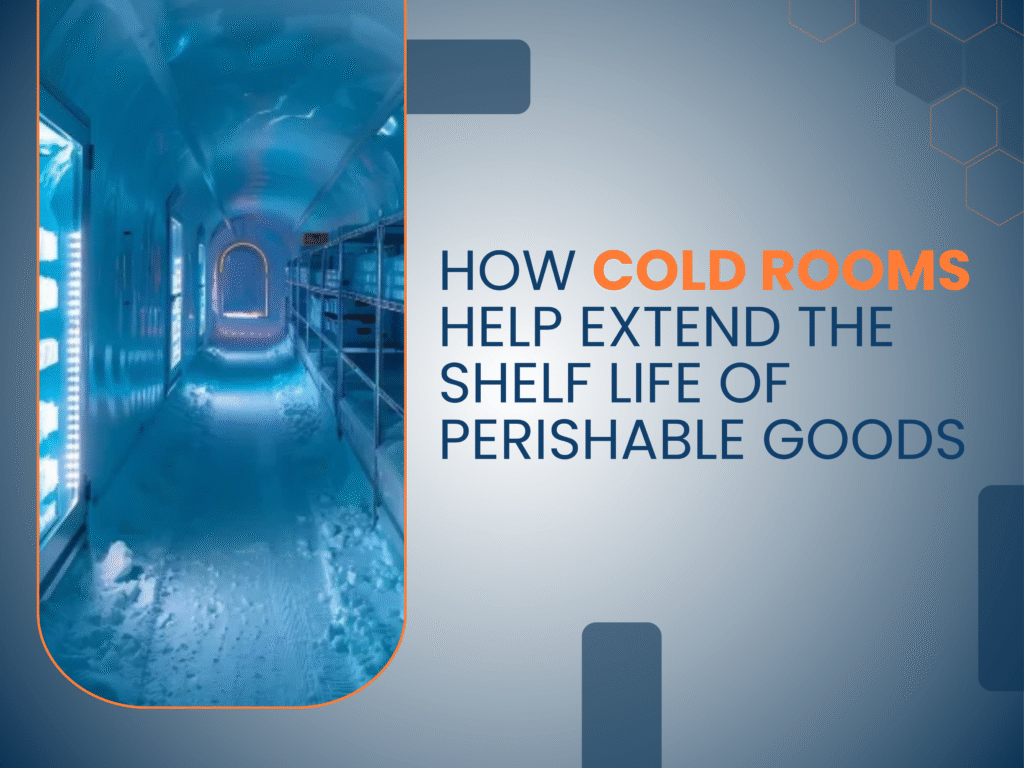In today’s fast-moving food and pharmaceutical industries, maintaining product freshness is critical. Cold Rooms Help Extend the Shelf Life of perishable goods such as fruits, vegetables, dairy, meat, and pharmaceuticals. These temperature-controlled environments slow spoilage, reduce waste, and enhance product quality, making them indispensable for modern supply chains.
Whether you are a retailer, distributor, or manufacturer, understanding how cold rooms work and choosing a reliable cold room manufacturer in Dubai can optimize storage efficiency and protect your investments.
What Are Cold Rooms and How They Work
A cold room is a temperature controlled storage space designed specifically to preserve perishable items. They are built with high-quality insulation and equipped with advanced refrigeration systems that maintain precise temperatures and humidity levels.
Key Features of Cold Rooms:
- Temperature Control: Keeps temperatures consistent, usually between 0°C and 5°C, to slow microbial growth.
- Humidity Regulation: Prevents dehydration or excessive moisture, which can spoil products.
- Air Circulation: Ensures even cooling and prevents “hot spots” that accelerate spoilage.
- Insulation: Minimizes energy loss and maintains a stable environment efficiently.
These controlled conditions are critical for industries where freshness and quality define customer satisfaction and compliance with regulations.
The Science Behind Shelf Life Extension in Cold Rooms
Perishable goods degrade due to microbial growth, enzymatic activity, and moisture loss. Cold rooms slow these processes by providing an environment that limits spoilage.
How Cold Rooms Extend Shelf Life
- Inhibit Microbial Growth: Lower temperatures reduce bacteria, yeast, and mold growth, the main causes of food spoilage.
- Slow Enzymatic Reactions: Enzymes that alter color, texture, and flavor act slower at low temperatures.
- Maintain Moisture: Proper humidity prevents wilting, shriveling, and dehydration of fresh produce.
- Delay Ripening: Fruits and vegetables remain fresh longer as cold storage slows natural ripening.
These mechanisms combined ensure that products stay fresh longer, reducing both financial losses and environmental waste.
Benefits of Cold Room Storage
Implementing cold rooms offers several advantages for businesses handling perishable goods:
1. Extended Shelf Life
Cold rooms preserve products for longer periods, reducing the need for rapid turnover and preventing wastage.
2. Better Inventory Management
Extended shelf life allows businesses to plan inventory, reduce overstocking, and manage seasonal demand effectively.
3. Enhanced Product Quality
Products maintain their nutritional value, texture, and taste, ensuring customer satisfaction.
4. Compliance With Food Safety Standards
Cold storage helps businesses meet safety regulations by controlling temperatures and preventing harmful pathogen growth.
5. Cost Efficiency
Reduced spoilage and waste translate into significant savings, boosting profitability.
Applications of Cold Rooms in Different Industries
Cold rooms are not limited to food storage. Their use spans several industries:
- Food & Beverage: Preserving fruits, vegetables, meat, dairy, seafood, and beverages.
- Pharmaceuticals: Storing vaccines, medicines, and other temperature-sensitive drugs.
- Floral Industry: Keeping flowers and plants fresh longer.
- Chemical Industry: Maintaining the stability of sensitive chemicals and reagents.
Choosing the right food cold storage room in Dubai ensures that products remain safe, fresh, and ready for distribution.
Best Practices for Cold Room Maintenance
To maximize efficiency and product safety, cold rooms require proper maintenance:
- Regular Inspections: Identify and address any system issues promptly.
- Temperature Monitoring: Use monitoring systems to maintain stable conditions.
- Cleaning Schedules: Prevent contamination and maintain hygiene.
- Staff Training: Educate staff on proper storage and handling procedures.
Adhering to these practices guarantees consistent performance and prolongs the life of both the cold room and stored goods.
FAQ’s About Cold Rooms
1. What is a cold room?
A cold room is a temperature-controlled storage facility designed to preserve perishable goods by maintaining specific low temperatures, typically between 0°C and 5°C.
2. How does a cold room extend the shelf life of perishable goods?
Cold rooms slow microbial growth, reduce enzymatic activity, control moisture, and delay ripening, keeping products fresh longer.
3. What temperature is ideal for cold room storage?
The ideal temperature varies based on the product but generally falls between 0°C and 5°C for most perishable goods.
Conclusion
Investing in a cold room is essential for businesses looking to maintain product quality, reduce waste, and extend the shelf life of perishable goods. By choosing a reputable cold room manufacturer in Dubai and following best practices, companies can ensure optimal storage conditions, operational efficiency, and regulatory compliance.



